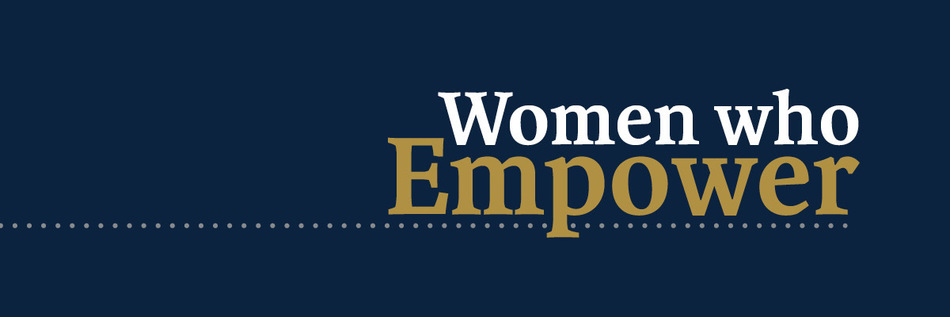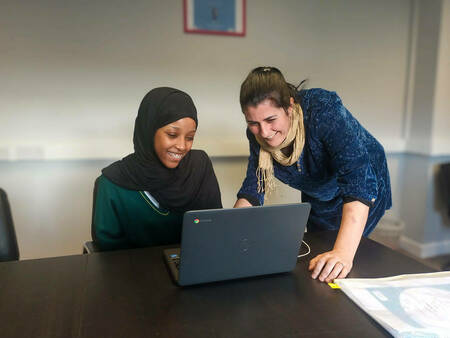Women Who Empower: Manuela Moreno


This story is part of Notre Dame International's series titled "Women Who Empower."
Manuela Moreno leads with love. It is central to her practice over the last 15 years with Youth Education Service (Y.E.S.) for Refugees and Migrants, an education, youth, and integration program in Dublin where she has acted in loco parentis to hundreds of unaccompanied minors and separated children seeking asylum in Ireland.
Since the 2015 refugee crisis in which 1.3 million migrants arrived seeking asylum in Europe, Irish social services have worked with the European Union Relocation Program for Refugee Children who arrive into hotspots like Greece, Italy, Malta, and Calais.
Youth Workers like Moreno create a loving community for refugee, migrant, and asylum seeking children in Ireland through educational programming, mentorship, and an extensive support network of both peers and professionals.
At Y.E.S., each “case” Moreno works with is as unique as each child, who is arriving into Ireland vulnerable and having experienced significant trauma throughout their journey from home countries such as Afghanistan, Albania, Eritrea, Ethiopia, Iran, Somalia, Syria, and more recently, Ukraine.
For Moreno, these are not cases but “my children.” Only through understanding their home countries, their cultures, and their customs can she best guide them through the integration process, into adulthood and ultimately independence in Ireland.
When asked about her motivations, Moreno says she “thinks about the children’s mothers.” Her work is guided by two questions: “How would I want my children to be treated in a foreign country? Who would be there to look out for them?” And in the answers to those questions, she finds her seemingly inexhaustible ability to care, to guide, and to give of herself.
Moreno was born in a small agrarian village in Spain outside of Seville. As the first in her family to attend university, she intimately understands the importance of education as the key to any hope of advancement.
“Education is the base,” she opines. “It is the minimum. There is other important and necessary work to be done, especially in infrastructure. But after food, water, and housing, you need education.”
She has always been involved in volunteering and NGO work, choosing to attend evening and night classes so she could work during the day with marginalized peoples in Seville, like the Gypsy community, migrant farm workers and children, and refugee populations from North African, Central and South American countries.
She discovered her passion for education access programs through work with Educación Sin Fronteras, which brought her to Morocco, Bolivia, and Guatemala where she witnessed firsthand the difference literacy can make — particularly for young women, who, without education, are confined to small spaces.
“Boys start working from a young age. They learn multiple languages in the marketplace and are even able to learn and improve their English,” she explains. “Culturally, our girls do not have the same access to employment, so without education, they are confined to the home and the family. Their world is minute.”
Moreno’s goal for each student is that they attend further education after secondary school, whether that be technical education or university, but realistically, she considers simply “slowing down” a successful outcome for any of her students.
“I just try to encourage our young people to slow down,” she says smiling. “They are impatient to learn English, to get through school, to start working, to get married, to have children. But they have to understand that they are behind their Irish peers, coming to this country with little to no English. And some may not even have formal classroom education experience.”
Most separated children start their Irish education within the Migrant Access Program (MAP) at Y.E.S. There, they learn English, Math, and essential life skills before integrating into the national school system.
Moreno explains that Transition Year (TY), a bridge year between the Junior and Senior Cycles in Irish Secondary Schools, is often the best place for teen-aged asylum seekers and refugees to start. TY is designed so students spend less time in the formal classroom and more time developing skills in independent learning, work experience, the arts and extracurriculars, which affords separated children in particular an opportunity to integrate and explore their new home and new culture without being wholly overwhelmed.
Among other services, Moreno organizes the Study Buddy homework help after school program where University of Notre Dame students studying abroad in Dublin have tutored for the last ten years. “I love my Americans,” she says, referring to the Notre Dame students. “They are always smiling, and they connect so well with our young people.” (You can read Emily Brigham’s reflection on her experience tutoring at Y.E.S. during her semester abroad in Dublin here.)
Y.E.S. programs are not only about preparation for exams and intellectual growth, but often more importantly about community and personal growth. Through the Irish school system alongside the afterschool and summer programs Y.E.S. provides, Moreno has the unique pleasure of witnessing these young people grow, little by little, in confidence and independence.
“The vast majority of the students in our Study Buddy program are young women,” she says. “By attending school, by mixing with people, being social, and most importantly feeling love within this education setting, young girls gain the self confidence to make change for themselves, their families, and their communities.”
The most extreme, but most successful, example of this is when Moreno sees young women in the program helping and encouraging each other to escape from abuse.
“If the young person was in an abusive home or community before migrating to Ireland, unfortunately that same abuse is sometimes reproduced here in Ireland if those particular family members migrate after,” she says soberly.
There are limitations to the legal interventions that can be made if the young person is over 18. “There is little I can do from a social work perspective for adults, but that is where the loving Y.E.S. community that we have built steps in,” Moreno explains. “It is only when our young people are educated that they begin to question what they know, to strive for more, to become ambitious and to break from the cycle of abuse.”
The thankless and tireless work Moreno and her colleagues do has a ripple effect beyond the students in their programs and through the entire refugee and migrant community. “Even if my students do not make it to university themselves, they tell me they will make sure their children will, and that their children will never experience what they have had to endure. I consider that alone a successful outcome,” she says proudly.
Learn more about the Women Who Empower series.
Originally published by at dublin.nd.edu on March 10, 2023.